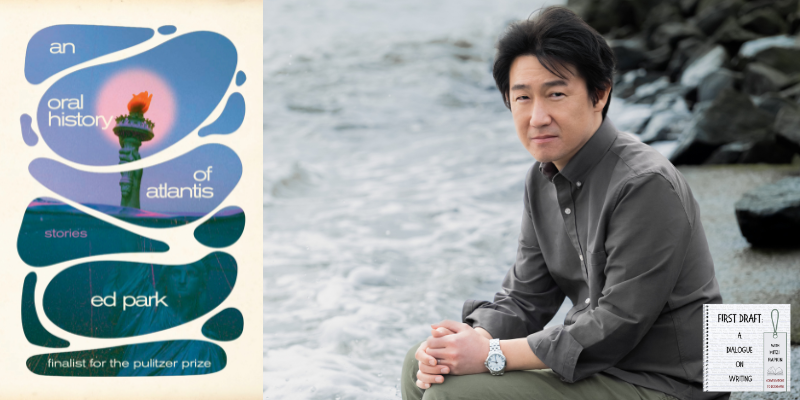
Ed Park on Trusting the Generative Mind
In Conversation with Mitzi Rapkin on the First Draft Podcast
First Draft: A Dialogue of Writing is a weekly show featuring in-depth interviews with fiction, nonfiction, essay writers, and poets, highlighting the voices of writers as they discuss their work, their craft, and the literary arts. Hosted by Mitzi Rapkin, First Draft celebrates creative writing and the individuals who are dedicated to bringing their carefully chosen words to print as well as the impact writers have on the world we live in.
In this episode, Mitzi talks to Ed Park about his new story collection, An Oral History of Atlantis.
Subscribe and download the episode, wherever you get your podcasts!
From the episode:
Mitzi Rapkin: Your stories feel so imaginative and very organic at the same time. What is it like for you to then go back and edit something with a critical mind that is very different than a generative mind?
Ed Park: That’s a great question. I think I trust the generative mind more in terms of fiction writing. Sometimes you have a literal dream when you’re sleeping and there’s something about the dream you want to express or sometimes you overhear a bit of conversation, or you notice something on a walk and often, you know, three or four of these things accumulate, and you have that eureka moment, like, oh, wait, these things belong together. Let’s see what happens. I really treasure that the most, because you can’t always order yourself to write the story. You always have to try, but it’s not always going to happen. So, I really value those moments where there’s something in the brain, I suppose, like that eureka moment when you realize how these things can fit together. So, I always try to go with that, extend that as much as possible, and then when it comes time to edit, you know, maybe there’s a logical gap or a plot hole, or something that I didn’t realize during that first question of inspiration and composition. They’re often like continuity issues. Maybe I give somebody’s age at one point and then mention a historical event that doesn’t match up chronologically. So, I think that that part is really important. And then there’s sort of the kind of the copy-editing side, which, you know, I was a copy editor for many years and when I write I’m not necessarily activating that, but when I’m editing, I am looking for ways to make the sentences as great as they can be. And so, you know you’ll notice repetitions that you didn’t see when you were first putting the words up on the page or on the screen. You know, both sides are valuable, but without the generative you don’t have anything. So, I really prioritize that.
***
Ed Park is the author of the novels Same Bed Different Dreams, a finalist for the Pulitzer Prize and winner of the Los Angeles Times Book Prize, and Personal Days, a finalist for the PEN/Hemingway Award. His fiction, essays, and reviews have appeared in The New Yorker, The New York Review of Books, Harper’s, The Atlantic, Bookforum, McSweeney’s, and elsewhere. He is a founding editor of The Believer and the former literary editor of The Village Voice and has worked in newspapers and book publishing. His debut story collection is An Oral History of Atlantis.
First Draft: A Dialogue on Writing
First Draft: A Dialogue on Writing is a literary podcast produced and hosted by Mitzi Rapkin. Each episode features an in-depth interview with a fiction, non-fiction, essay, or poetry writer. The show is equal parts investigation into the craft of writing and conversation about the topics of an author’s work.



















